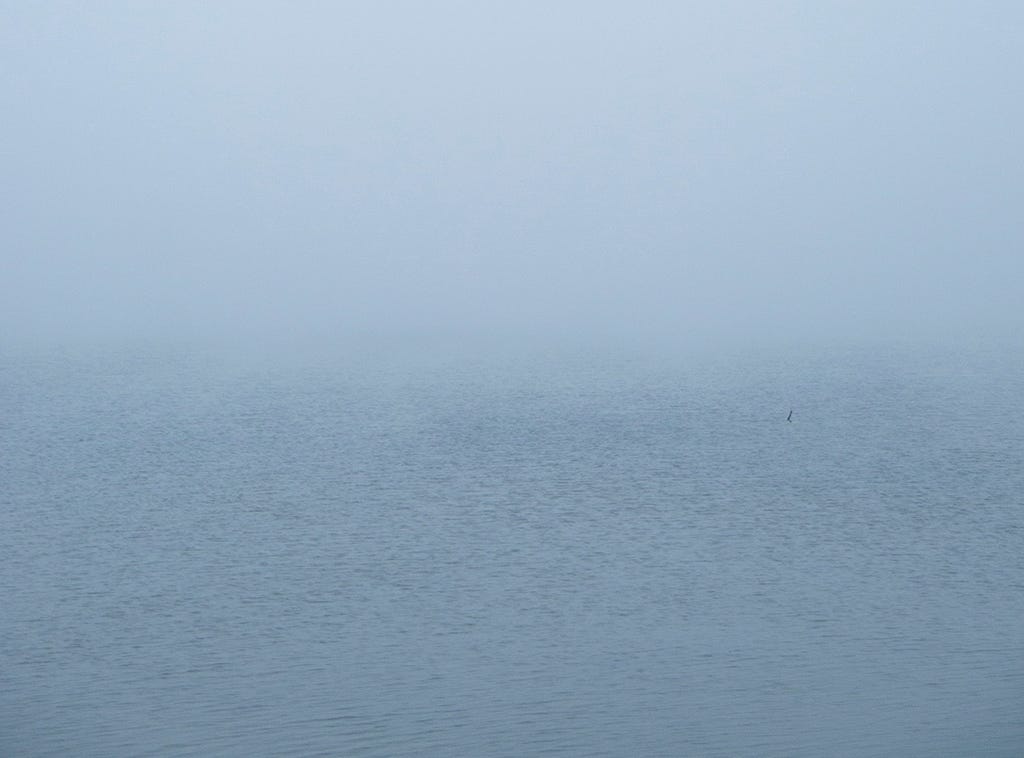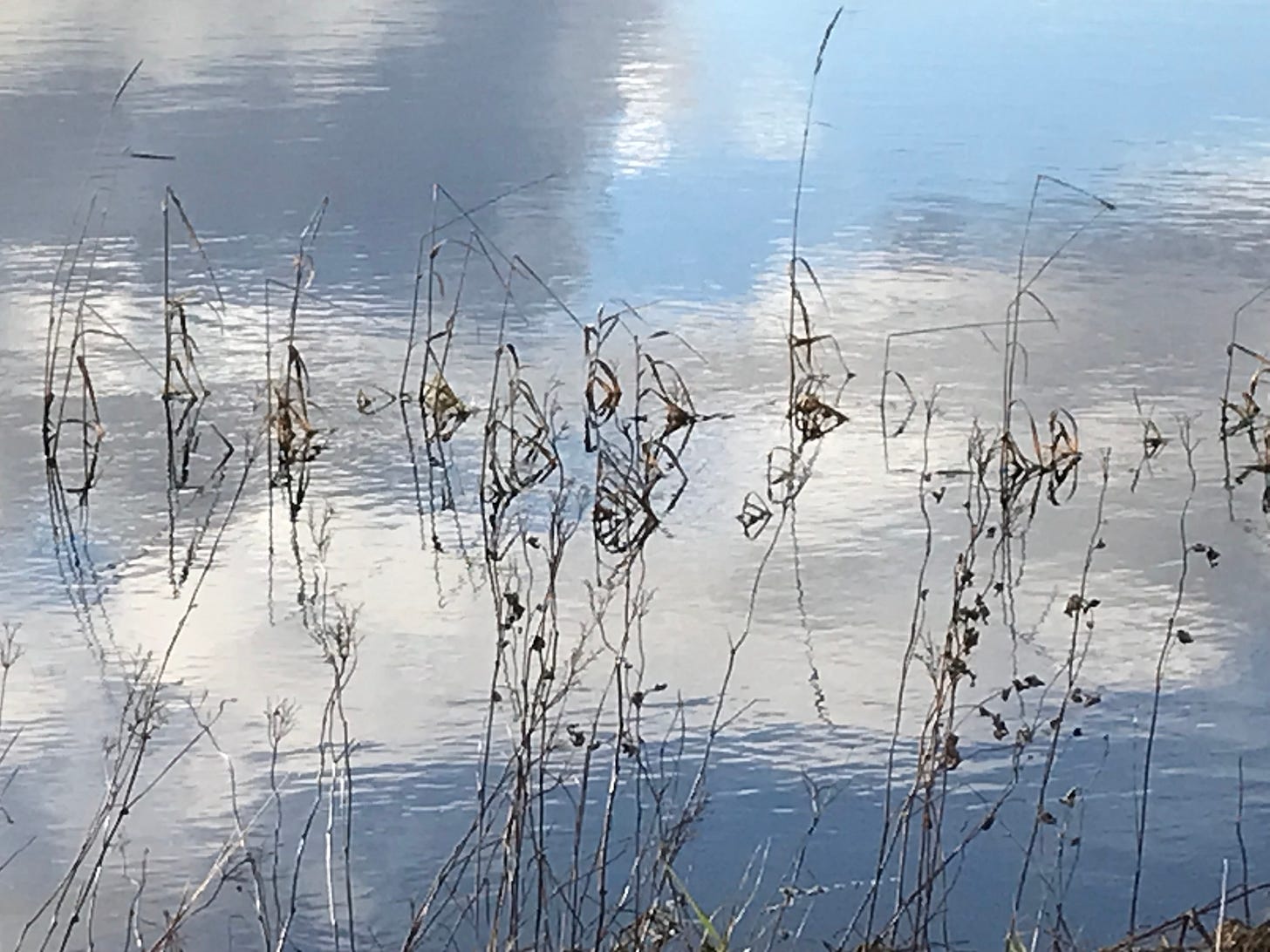Silence is ecological
Silence is our birthright and our natural home. It's political. And it’s subversive.
One of the things I enjoy most about mentoring other artists and writers is the rich and thoughtful correspondence that opens up around their work. The ideas they want to explore find new resonance in our conversations. Old ones bloom back into life as new connections are made. In one recent exchange, a topic came up again that I’ve written about before: Silence. What follows is a revisiting of a post I first wrote on the subject in 2022.
A couple of years ago I took myself off on a winter meditation retreat at the Centre for World Peace and Health on Holy Isle. I was there for three weeks. It felt like a long time for me, but the whole retreat runs for three months every year, and many others there were going the full distance.
One of these brave souls was a fascinating woman I had many quiet fireside conversations with at the end of a day otherwise passed in silence. She was, still is, an Anglican solitary nun who introduced herself simply as Martha. Quite elderly, I guessed, but stocky and active, she was usually to be found at the kitchen sink peeling potatoes or washing up after our meals.
Acerbic, humble, and plain speaking, there was something about Martha that made me gravitate towards her. I felt the presence of real, hard-won wisdom and insight. As we spoke I discovered that here was someone with a deep, scholarly and practical understanding of solitude, silence and the contemplative life. I was told by another retreatant that in her younger days Martha had spent many years in solitary retreat far out in the wilds of Alaska.
Although I don’t share her faith, I was fascinated to learn from her about the place of silence and contemplation in the Christian tradition, something she felt had been deliberately suppressed and was in danger of being lost.
SILENCE: A USER’S GUIDE
When I got home I looked her up. It turns out that my new friend is in fact a scholar of some renown, a Stanford-educated professor of theology, no less, who had at one time been Bishop Desmond Tutu’s spiritual director, and who had published a two-volume study under her secular name Maggie Ross, called Silence: A User’s Guide.
It’s not a read for the faint-hearted and there are more accessible books on silence available, but it’s written from a deep scholarly and practical understanding of the subject. I thought I’d share some gleanings from her writing on silence, solitude and community as I’m finding new relevance in them this time round.
Because it’s clear that our culture is not conducive to silence. In fact it’s seen as suspect, a kind of death. Solitude is often cast as loneliness, although the two experiences are utterly different. And both silence and solitude are viewed as passive, anti-social, even a dereliction of duty.
But Martha/Maggie has no truck with this view and nails her colours firmly to the mast:
Communities are only as healthy as the solitudes that make them up, so that it is incumbent upon each of us to do the transfiguring work of silence.
This makes me sit up and take notice. Silence, then, is not a self-indulgence or a dereliction of our public and civic duties. In fact it’s the opposite. It’s our public duty. And an urgent one.
The human race is sleepwalking into extinction. If we are not to destroy our beautiful planet and our selves with it then we must learn to live more simply, more carefully, more joyfully.
Maggie/Martha proposes that our hunger for wildlife documentaries and trips to windswept beaches is symptomatic of our estrangement from the inner silence which is in fact our birthright and the source of our own wisdom.
Silence is a necessary rebalancing…noise obliterates silence and these days we are pressured on all sides by the noise of twisted minds spinning in closed loops. The babble used to sell their crazy agendas is persuasive because most listeners have no experience of silence, and therefore have no intellectual or emotional autonomy through which to critique the insanities and inanities on offer. But this is exactly what politicians and corporations want, because if we stopped to balance our lives with a little transfigurative silence…we might become aware that we are rapidly becoming their slaves.
No wonder, then, that we find these clamorous, argumentative times so bewildering. But what can we do? We can’t all take lifelong vows and become a hermit in the wilderness like Martha.
A PRACTICE OF SILENCE
Thankfully, it isn’t necessary to take such drastic measures. All we need to do is remember to create some space for silence to enter our lives and do its work in us.
Anyone can undertake the work of silence. It requires only openness and receptivity, a relinquishing the complex blandishments and noise of consumer society for simplicity, silence, and self-forgetfulness, a turning away from narcissism to welcome the other. The work of silence is so simple, yet to go against the grain of society and the culture is very difficult. But it is worth the effort: the work of silence…provide[s] stability and even joy in a disintegrating world. People who undertake to live like this become beacons, islands of safety where others can find a refuge. The resonances of silence permeate around them, whether they are aware of them of not.
She suggests this very simple practice:
…perhaps one of the most important, and that is learning to sit perfectly still for half an hour, perfectly relaxed mentally and physically, not meditating or doing anything with the mind except allowing the silence to seek it. This can be done, like learning to meditate, in increments.
Gradually, over time, again without your knowing why or how, silence will seat itself in you, in your core, and you can access it with increasing fluidity. In fact eventually you will be living from the wellspring of silence instead of having silence as something you seek. It will come to live in your core.
In this understanding of silence and solitude they become not only more accessible to those of us with jobs and families, but a necessary part of being a good citizen, neighbour, friend, parent.
Silence is ecological, our natural habitat, not the world of noise that surrounds and stresses us.
Silence is political. It’s ecological. And it’s subversive. It’s our birthright and our natural home.
In the midst of increasingly tumultuous world events and snowballing calamities, it’s time to reclaim it.
May you find some silence this week
Sam
Thank you to all of you who have taken out a paid subscription. It means the world to me that you wish to support my work in this way.









I love these reflections so much Sam. Thank you 🙏 I too believe this is what we so desperately need. I've been a practicing Buddhist for years and I'm familiar with meditating in silence but for me it's much harder to carve out a space in my day where I "do" in silence - things like housework, without podcasts or music. I love that she suggests silence as a practice separate from meditation.
Love this, Sam, thank you.